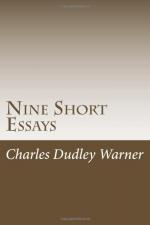In a piece of fiction, especially romantic fiction, an author is absolutely free to be truthful, and he will be if he has personal and literary integrity. He moves freely amid his own creations and conceptions, and is not subject to the peril of the writer who admittedly uses facts, but uses them so clumsily or with so little conscience, so out of their real relations, as to convey a false impression and an untrue view of life. This quality of truthfulness is equally evident in “The Three Guardsmen” and in “Midsummer Night’s Dream.” Dumas is as conscientious about his world of adventure as Shakespeare is in his semi-supernatural region. If Shakespeare did not respect the laws of his imaginary country, and the creatures of his fancy, if Dumas were not true to the characters he conceived, and the achievements possible to them, such works would fall into confusion. A recent story called “The Refugees” set out with a certain promise of veracity, although the reader understood of course that it was to be a purely romantic invention. But very soon the author recklessly violated his own conception, and when he got his “real” characters upon an iceberg, the fantastic position became ludicrous without being funny, and the performances of the same characters in the wilderness of the New World showed such lack of knowledge in the writer that the story became an insult to the intelligence of the reader. Whereas such a romance as that of “The Ms. Found in a Copper Cylinder,” although it is humanly impossible and visibly a figment of the imagination, is satisfactory to the reader because the author is true to his conception, and it is interesting as a curious allegorical and humorous illustration of the ruinous character in human affairs of extreme unselfishness. There is the same sort of truthfulness in Hawthorne’s allegory of “The Celestial Railway,” in Froude’s “On a Siding at a Railway Station,” and in Bunyan’s “Pilgrim’s Progress.”
The habit of lying carried into fiction vitiates the best work, and perhaps it is easier to avoid it in pure romance than in the so-called novels of “every-day life.” And this is probably the reason why so many of the novels of “real life” are so much more offensively untruthful to us than the wildest romances. In the former the author could perhaps “prove” every incident he narrates, and produce living every character he has attempted to describe. But the effect is that of a lie, either because he is not a master of his art, or because he has no literary conscience. He is like an artist who is more anxious to produce a meretricious effect than he is to be true to himself or to nature. An author who creates a character assumes a great responsibility, and if he has not integrity or knowledge enough to respect his own creation, no one else will respect it, and, worse than this, he will tell a falsehood to hosts of undiscriminating readers.




